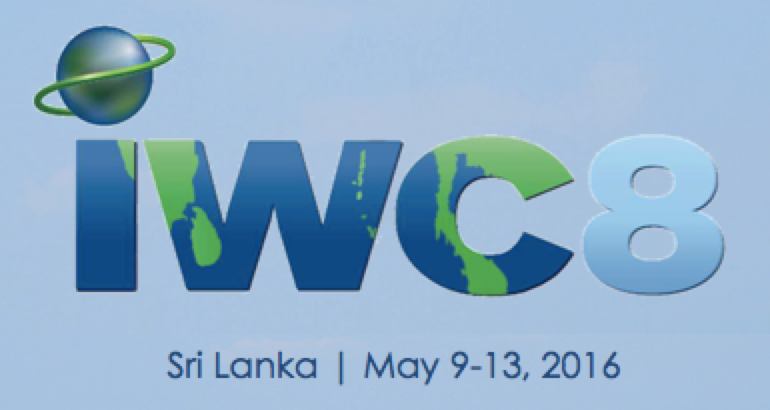The 8th Biennial International Waters Conference (IWC8) convened under the theme, 'Scaling Up GEF IW Investments from Source to Sea and Beyond in the Context of Achieving the SDGs.' The conference highlighted the role of oceans in regulating climate, maintaining biodiversity, and promoting global food security, noting current threats to fish stocks and coral reefs.
 15 May 2016: The 8th Biennial International Waters Conference (IWC8) convened under the theme, ‘Scaling Up GEF IW Investments from Source to Sea and Beyond in the Context of Achieving the SDGs.’ The conference highlighted the role of oceans in regulating climate, maintaining biodiversity, and promoting global food security, noting current threats to fish stocks and coral reefs.
15 May 2016: The 8th Biennial International Waters Conference (IWC8) convened under the theme, ‘Scaling Up GEF IW Investments from Source to Sea and Beyond in the Context of Achieving the SDGs.’ The conference highlighted the role of oceans in regulating climate, maintaining biodiversity, and promoting global food security, noting current threats to fish stocks and coral reefs.
Around 250 participants attended the IWC8, including project managers of international waters-related projects, and representatives of beneficiary countries, non-governmental organizations, UN agencies and the private sector. The UN Development Programme (UNDP) and the Sri Lankan Ministry of Mahaweli Development and Environment cooperated with the Global Environment Facility (GEF) to jointly organize the event.
The conference comprised technical site visits and training sessions on topics including the preparation of transboundary diagnostic analyses, the water-energy-food-ecosystem nexus, and water diplomacy. In a press release about IWC8, the GEF highlighted the importance of the Sustainable Development Goals (SDGs) for investments in international waters, especially in relation to ensuring availability and sustainable management of water and sanitation for all (SDG 6) and conserving and sustainably using the oceans, seas and marine resources for sustainable development (SDG 14).
A high-level session on the last day included government ministers from Angola, Seychelles, Maldives and Sri Lanka. The session heard report-backs from discussions around the three “pillars” of the conference: catalyzing and scaling up project investments; strengthening governance processes to sustain project interventions; and data to policy. On project investments, delegates reflected on good practices toward meeting the SDGs, promoting transformational change in major global industries, and private sector engagement for water stewardship in priority basins. On governance processes, they discussed challenges and opportunities in managing resources across the source-to-sea continuum, useful tools in multi-level water cooperation, conjunctive management of water resources, and sustaining regional institutions for large marine ecosystem (LME), groundwater and freshwater management. On data to policy, they discussed current trends in transboundary water management, modern data, tools and indicators for assessing the status of international waters, and gender equality considerations, including connections between SDG 5 (Achieve gender equality and empower all women and girls) and SDG 6 on water and sanitation.
Christian Severin, GEF International Waters portfolio, noted that around 70 active GEF projects were represented at the conference, out of the total portfolio of 242 projects on international waters to the value of US$10 billion of funds from both GEF and co-financiers. He said that the GEF, as the world’s largest financier of cooperation in shared waters systems, occupies “a unique space” in the international sphere to help facilitate countries’ delivery of the SDGs, leading to sustainable management of shared aquifers, lakes, rivers, large marine ecosystems and open oceans.
The GEF also launched two publications at IWC8: ‘From Coast to Coast,’ presenting the impact of GEF water projects over the years, and ‘Scaling Up Community Action for International Waters Management,’ which describes the experience of the GEF Small Grants Programme.
At the closing plenary, GEF Chief Executive Office Naoko Ishii highlighted the value of the GEF’s knowledge management mechanism IW:LEARN as a tool for countries to deliver on the SDGs, and she called for ensuring stronger links between IW:LEARN, the private sector and civil society.
A two-day international roundtable discussion took place immediately following IWC8, on the topic of ‘Partnering with the Private Sector for Sustainable Financing from Source to Sea.’ The roundtable examined the possibilities for multi-stakeholder partnerships to be developed among private and public sector entities, including international water management commissions, marine management organizations and civil society, bearing in mind the new global commitment to the SDGs.
IWC8 took place in Negombo and Colombo, Sri Lanka, from 9-13 May, and marked 25 years of GEF support for the management of international waters. The IWC takes place every two years and seeks to promote learning across sectors related to international waters. Previous IWCs have taken place in Australia, Barbados, Brazil, China, Croatia, Hungary and South Africa. [IWC8 Web Page] [IWC8 Closing Press Release] [IWC8 Opening Press Release] [Agenda] [From Coast to Coast] [Scaling Up Community Action for International Waters Management]